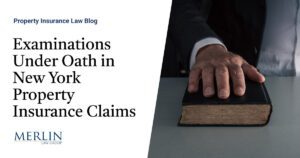Insurers must defend, even if damage falls below the deductible

Insurers have a duty to defend in construction cases involving policy exclusions for a “work performed” or “own work,” even if the amount of property damage claimed falls under the policy deductible, Ontario’s Court of Appeal has ruled.
In GFL Infrastructure Group Inc. v. Temple Insurance Company, Distillery S.E. Development Corp., Cityscape Development Corporation and Dream Asset Management Corporation [the Distillery parties] undertook the Clear Spirit Condominium Project to build a residential condominium tower in the Distillery District of downtown Toronto. The condominium tower came to be owned by Toronto Standard Condominium Corporation No. 2299 (TSCC 2299).
The Distillery parties hired GFL Infrastructure Group Inc. to complete temporary shoring work during the construction of the building, Ashland Construction Group Ltd. to supply and install asphalt for the floor surface of the parking garage, and Rite-Air Mechanical Co. Ltd. to perform the HVAC work. The construction was finished in 2013.
An engineering firm retained by TSCC 2299 discovered several deficiencies in the construction of the condominium building. In 2015, TSCC 2299 sued the Distillery parties for $9.913-million for property damage caused by negligence and defects in the construction of the building.
Temple and Aviva insured the Distillery parties. GFL, Ashland and Rite-Air were additional insureds under a Specific Project Wrap-Up Liability Policy (the Project Policy) issued by the insurers for the condominium project. The Project Policy includes a $10,000 deductible for property damage, intended to cover all contractors, subcontractors, engineering and architectural consultants as additional insureds.
The Project Policy includes several exclusions, including “work performed” or “own work” exclusions, for the repair or replacement of defective work.
Commercial General Liability (CGL) policies typically contain such policy exclusions for construction projects because they are not supposed to insure against breaches of contract or poor workmanship. They are not supposed to cover the work done by insured contractors; that’s because this is a regular business risk assumed by contractors, who control the building materials used and how they are installed (i.e. when they perform their own work poorly, it’s not an “accident”). The Project Policy for the Distillery parties contained several exclusions, including “work performed” or “own work” exclusions for the repair or replacement of defective work.
Insurers have a duty to defend even if there is a “mere possibility” that the policy exclusions may not apply, the motions judge observed, who initially found Temple and Aviva had a duty to defend.
The Appeal Court likewise found against the insurers. Among the many arguments it considered, the Appeal Court found the insurers still have to defend the case, even if the property damages claimed fall under the policy deductible of $10,000. Essentially, the court found it would take a trial to find out whether the property damages in fact exceeded the deductible, since they came so close to the limit.
“TSCC 2299’s claim for damages is for $9,913,169.25,” the Appeal Court ruled. “The [insurers] concede that at least $8,507.66 of this claim comes within the insurance coverage. Therefore, the question is whether there is the possibility of another $1,492.35 of ‘Property Damage’ in an almost $10-million claim. To state the question is to answer it…..
“Accordingly, I agree with the application judge who, in his first decision, said:
‘In the immediate case, it is a fluke of five iterations of an overly particularized and detailed pleading by TSCC 2299 that the argument could even be made that the property damage did not exceed the [$10,000] deductible….
Through a fluke of pleading, the court has been asked to undertake a forensic analysis that went far beyond the interpretation of the terms of the insurance policy measured against the Statement of Claim and would have taken the court into territory better and best explored at the trial. It is to be remembered that the duty to defend is engaged by the mere possibility that there may be coverage for property damage.
Thus, I need not determine whether the deductible impacts the duty to defend as a general principle.’”
Feature image courtesy of iStock.com/PeopleImages





